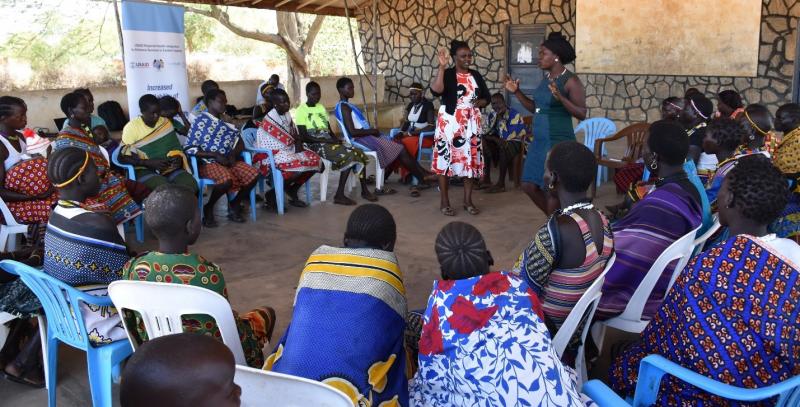Where We Work
See our interactive map


After surviving gender-based violence, she’s using her experience to mentor other girls and end harmful customs in her community.
Regina Nadim is an 18-year-old survivor of gender-based violence (GBV) who now uses her story to encourage other girls to seek support in Uganda’s Moroto District.
As a young girl in rural Karamoja, Regina never went to school and had no social or economic support.
“My parents could not afford school fees,’’ Regina says. "They only saw me as a source of labor and a dowry. There was no one to help me and it was difficult to find odd jobs."
Regina’s story is typical for a Karamojong girl from a resource-constrained community. Girls are groomed to do house chores and are a source of manual labor on farmlands. This leaves them vulnerable to abuse—such as courtship rape—that exposes them to HIV.
Regina was abused by young men during courtship (edonga) on several occasions. Ashamed and with no one to share her pain, she chose to keep quiet about her traumatic experiences and their consequences.
“In hopes of finding a suitable partner I was exposed to abuse," Regina says. “I felt humiliated and worried I could be infected with HIV.”
In Uganda, statistics from the 2016 Demographic Health Survey show 51% of women and 52% of men have experienced physical violence. And 22% of women and 8% of men have experienced sexual violence. According to the World Health Organization, one in every three women has been beaten, coerced into sex, or abused in some way.
Girls in particular face multiple vulnerabilities in their families, schools, and communities. Isolation due to restricted mobility, lack of basic support, dropping out of school, and feelings that they don’t belong all disconnect them from programs and services that aim to help.
But this is changing for girls like Regina in Karamoja.
I want to continue mentoring my peers and change mindsets by sharing my story so that more lives can be changed.
Regina was invited to a safe community space initiated by IntraHealth International’s Regional Health Integration to Enhance Services in Eastern Uganda (RHITES-E) project. Now, Regina and young women from similar backgrounds come together to learn lifesaving skills and share their stories through community dialogue on GBV, HIV prevention and treatment, family planning services, and negotiating for safe sex such as condom use and treatment for sexually transmitted infections.
RHITES-E collaborates with local village elders and community champions like Lokomol Albino to conduct safe-space dialogues. Lokomol is a village health team member in Regina’s village and was able to keep in touch with Regina, making sure she participated in the project.
“I was trained by RHITES-E and I am using my knowledge to find, inform, and empower girls like Regina,” Lokomol says.
Through these dialogues, RHITES-E has reached 500 vulnerable girls and young women, offering them GBV prevention services and referrals to the nearest health centers and hospitals for further support. The project has also engaged local elders and health workers to handle GBV cases through prevention and reporting procedures.
"The safe space offered me a chance to share experiences and learn from other people who have gone through similar challenges,” Regina says. “I was able to access services like HIV testing and talk freely about gender-based violence incidences without judgement. I am now a proud role model for other vulnerable girls in my community.”
Because of these interventions, Regina has gained self-confidence and has brought ten other vulnerable girls to the dialogues. Word has now spread to other village women and girls in the neighboring subcounty.
Today, Regina is still on the road to full recovery, but the major difference is a change in attitude. She is using her newfound freedom to mentor her peers on the risks of unprotected sex and how to negotiate for safe sex.
"I want to continue mentoring my peers and change mindsets through sharing my story," she says, “so that many more lives can be changed for the better.”
IntraHealth’s RHITES-E project is funded by the US Agency for International Development.
Get the latest updates from the blog and eNews




